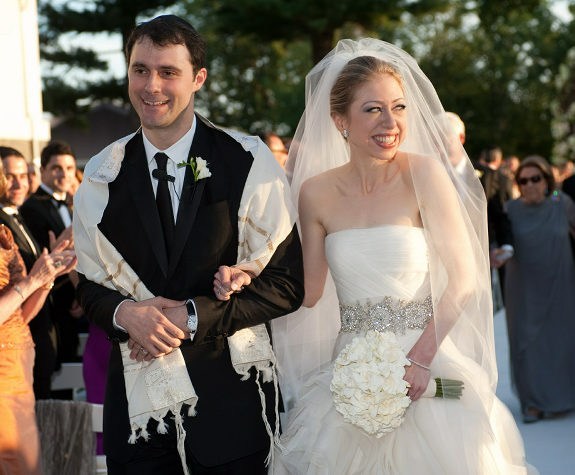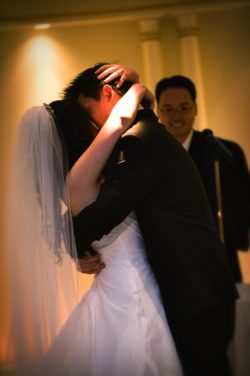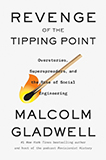Yesterday, I read an article in USAToday stating that the recent wedding of Chelsea Clinton, a Methodist, and Marc Mezvinsky, a Conservative Jew, reflects the growing rate of inter-faith marriages in the US.

Congrats to the happy couple — Chelsea Clinton looks to be positively glowing…and what a gorgeous gown!
According to the article:
Two decades ago, 25% of U.S. couples didn’t share the same faith. That was up to 31% by 2006-08, according to the General Social Surveyby the National Opinion Research Center at the University of Chicago. The number was even higher, 37%, in the 2008 U.S. Religious Landscape Survey by the Pew Forum on Religion & Public Life. Both surveys included people who crossed major traditions, such as Jewish-Protestant, believers married to the unaffiliated, and Protestants of different denominations, such as former president Bill Clinton, a Baptist, and Secretary of State Hillary Rodham Clinton, a Methodist.
Seeing that the latest date in the excerpt above is 2008, I’m guess that the number of inter-faith marriages in the US is even higher today — perhaps at about 40% based on the trends above.
With this data in mind, I can’t help but wonder…how important is sharing the same faith (or lack thereof) when deciding to tie the knot?
To me, it is very important. My faith affects everything from the very definition of marriage to why/how I resolve conflict to where we spend Sunday mornings.
J’s family is atheist, but he attended a Baptist boarding school in England and so learned about Christianity through the mandatory services and other Christian-based procedures practiced by the school. When we started dating, he was not a church-goer, but considered himself a Christian. As such, he had no problem when I suggested that he start attending church with me.
However, my husband and I started as different denominations: he was a Baptist, while I was raised and remain a Presbyterian (PCA, not PCUSA). And although he agreeably accompanied me to my church, he was bewildered and a bit shocked at the different worship styles (the British Baptist style of worship is very traditional, with set rituals, organs and hymnals while I am used to the American contemporary style of worship) and the Calvinist concepts of predestination and total depravity.
In addition to denominational differences, I cannot say that we were on the same page — spiritually speaking — as I have attended church regularly all my life and like to think that I have an intimate relationship with God. J believes in the basic tenants of Christianity but has yet to form a fully devoted connection with his faith.
Despite the differences, I love the fact that my husband is willing to learn and receptive to a more intimate relationship with God, as well as to my denomination. I love that he agreed to pre-marital counseling through the church, and wants to raise our children as Christians. I also love that he is willing to forgo Sunday afternoon NFL games to attend church with me. ![]()
So while marrying a Christian man was extremely important to me, the different denominations and dedication to our faith was not too big of a problem in our case.
Still, the fact remains that I could have never married a non-Christian. This isn’t to say that all inter-faith marriages are doomed for failure; I just could never do it myself. Just like people with strongly opposed political views, or even a dedicated vegan marrying a meat-lover, there are couples out there who make it work. However, I believe that if your beliefs are that strong and that important in your life, you need to find someone who compliments and accepts them and lives to build you up in them.
What do you think? How much of a factor does faith play when choosing a marriage partner? Are you and your spouse/SO on the same page when it comes to religion? If not, how do you make it work?






 I like books, gadgets, spicy food, and art. I dislike shopping, hot weather, and the laws of entropy. Although I am a self-proclaimed computer nerd, I still have a love for handbags and makeup... and I am always teetering on high heels. To learn more about me, visit the
I like books, gadgets, spicy food, and art. I dislike shopping, hot weather, and the laws of entropy. Although I am a self-proclaimed computer nerd, I still have a love for handbags and makeup... and I am always teetering on high heels. To learn more about me, visit the 


I don’t think i could marry a non-Christian, either. Although the denomination issue is moot–that wouldn’t bother me as much. Unless we’re talking ultra conservative denominations, then, that’s out.
I’m in an inter-faith marriage, but we’re "on the same page." Even if our religions are completely different, our faiths are quite similar, and in the end, that’s what’s important. We’re not staunchly religious people, but we value good, strong morals and a belief in God (and raising children that value these things as well).
First, kudos to you for continuing to write about a topic that I know you’ve gotten a lot of flack for. I’m too much of a worrier to actually bring up the topic on my own blog, and for that, I salute you.
Since you asked, though, I thought I’d share – my husband is a devout Atheist. He grew up in the Mormon church and decided as a teen that he no longer agreed with those beliefs and has since had none. Before we dated, we were really good friends for a long time, so I knew all of this when I decided to date him. I grew up in a pretty religious family (church every Sunday, my parents were involved with the worship services), but my parents stopped going while I was a teen for their own reasons, and I pretty much quit going myself. For a while, I didn’t really think about religion at all. Then in college, I discovered one of my favorite authors, Ralph Waldo Emerson, and decided that I was a transcendentalist/secular humanist. That’s pretty much been my view ever since. I guess it’s kind of hippieish – I just wish all the religions could coexist peacefully, even though I’m not particularly sided with any one. That might change, but for now I’m satisfied with trying to abide by the golden rule.
It was tough for me at first to listen to my husband say that he doesn’t believe in God. We had many (delicate) talks about it, and he doesn’t try to persuade me one way or another. We have many good friends that attend church regularly, though, and for the most part, religion is something we try to steer clear of during conversation.
Once the baby is born, we intend to introduce him to many different cultures and religions and hope that he will be able to make up his own mind about it. If he wants to become a member of a specific church, we will fully support that. If not, we’ll fully support that, too.
Oh I agree. I am a Hindu and I am sure I could never marry a non-Hindu. A friend of mine did that and married a Christian a couple of years ago and she is facing so many problems now. It becomes worse when you have children.
Ahh Jenny. I wish we could chat over a cup of coffee sometime 🙂 I actually had a lot of thoughts on your Anne Rice post but I didn’t even know where to start, and I was a bit afraid. lol… but yes, I feel like I’m SO WITH YOU on 100% of your views — which in this day and age is incredibly rare!!! I totally agree with you on everything!!!
It’s funny because daniel and i have absolutely nothing in common — life, music, hobbies, friends — EXCEPT for our views on God and the church. And in the end, it really comes through every single thing in our lives. I get scared though, because if any of us falls out of our faith or simply changes their mind, we are totally screwed. lol.
Anyways, keep it up girl. I’m SO THANKFUL that there are people like you who can talk openly about their faith (true faith, not Sunday Christian faith) and the TRUE GOSPEL with huge dosages of love and grace. You go girl 🙂
(hope you’re feeling better!)
I’m also Presbyterian (and yep, the PCA/PCUSA distinction is a pretty important one to make — I’m PCA but attending an ARP church now), and my husband was raised PCA as well, with little dabblings in the Reformed Episcopal church every now and then.
I don’t think I could have married someone who wasn’t Reformed, let alone someone who wasn’t Christian. Being Reformed is such a huge part of my thought process and view of the world intellectually, that I would feel like I couldn’t really have deep discussions (and keep my cool) with say, a Baptist or Catholic husband. As it is, my husband has been a major influence in giving me a deeper understanding of my faith and why it is a *rational* faith.
But even more than that, I don’t think I could stand the thought of having a non-Christian husband and knowing that he doesn’t know the Lord and will have to spend eternity apart from Him. I’m not saying that others can’t (and do!) make it work, but I just don’t think I’m cut out for it.
This is actually a huge problem for modern Judaism because, somewhat ironically given our history, we’ve become so well loved and accepted by American culture that many people feel we’re in danger of being assimilated out of existence. The interfaith marriage numbers jump by a huge amount in Judaism, with some estimates suggesting that more than half the young Jews getting married are marrying non-Jews.
The Reform movement, which is supposed to be the most modern and liberal, is having major trouble adapting to the idea of interfaith families and children; they’re trying to figure out how to keep the kids involved and identified as "Jewish", but haven’t seemed to realize that if you’re not fully warm and welcoming to their parents, you probably won’t get the kids.
Strangely, Hebrew Union College, the school that ordains Reform rabbis, will not accept or ordain anyone "married to, engaged to, or seriously dating" a non-Jew. Which means Reform Judaism is now more accepting of homosexuality than Christianity.
Which brings me back to my general theory about separating personal belief from affiliation with a given denomination, organization, or religion.
Interestingly, there’s a huge biblical precedent for interfaith marriage, and despite the commonly accepted interpretations there is no evidence these involved conversion of any sort. Minor biblical characters like Moses. Ruth’s famous conversion (she’s regarded as the first Jewish convert) consisted of saying, "Your people shall be my people", so by modern standards she wasn’t Jewish, and her line led to King David and to Jesus.
@Carol — Thank you so much for your encouraging words! Let’s def get together sometime soon!
@Aaraon — I never knew that about Judaism…thanks for enlightening me!
I’ve known from reading your blog for a while that you are a Christian, but I never realized you were in the PCA!
My IL’s are the in PCA, and we go to a very similar church of a different reformed denomination.
I dated a baptist before dating Eric and realized at the point how important it was to me to be on the same page spiritually and theologically with a future spouse. Eric’s now attending a reformed seminary (and I work there) and I couldn’t imagine if we weren’t in the same place at this point in our lives because we’re both spending a lot of time developing knowledge and convictions about our faith together.
it’s something that is an integral part of our marriage and my husband’s spiritual initiative and leadership is easily the best part of our marriage.
@Aaron: You hit a huge problem for me that I wasn’t sure I wanted to bring up:
"..they’re trying to figure out how to keep the kids involved and identified as "Jewish", but haven’t seemed to realize that if you’re not fully warm and welcoming to their parents, you probably won’t get the kids."
I honestly can’t grasp this concept. I talked to over 20 rabbis trying to get them to perform a Jewish wedding ceremony for me and my (non-Jewish) husband. While some rabbis cordially declined to do so, most were so blatantly rude to me and my parents (active members of their Jewish community) that I was so close to throwing in the towel and getting a JOP. Why on earth would I raise my children in that kind of environment?!
For those of you who say that you could "never" marry someone outside of your religion or who "can’t stand the thought" of doing so, why not? Do you believe your faith and core values to really be that different? Or does it have more to do with the differences in culture?
I met my husband at church. We were engaged within 4 months. For me, it just makes sense to marry someone who is the same faith. It’s emotional shorthand. Whenever one of us starts acting a little too selfishly, we can tap the other on the thigh and say "Hey! Whoever said your life is about you?" (meaning: "A-hem! Reality check: you are here to worship God, make disciples of every nation, and love your neighbor as yourself…yes?")
It’s just a choice that makes life a little easier. I dated lots of men of other faiths or no faith when I was younger. I’m sure a few of them would have made fine husbands. However, in my late 20s, when I became more interested in attending church and studying the Bible and praying, it just made sense to date from that pool of potential mates who could support those things — not because they admire it from afar or allow me the room to do it, but because it’s what they do, too.
My first husband declared his atheism 2 weeks before our wedding and I was too foolish to call it off. I thought that because we had so much else in common, it could still work. We had been together for 4 years, and had previously seemed to be on the same page spiritually. I’m not saying that it can’t work for some people, but it didn’t work for us. The reality check that Erin mentioned simply wasn’t there once he lost his faith. Everything became about him, and I watched the kindness drain out of him for over two years. He changed completely and it was not a good situation. When I remarried, it was to a man of faith, who sees eye to eye with me. I like the phrase that someone used above, "emotional shorthand". So many things did not have to be explained, and I felt so understood. I’m glad it works for some people, and I wish them the best. Having tried both though, I know it was the only way for me.
@Amy: I just want to point out that atheism and diminishing kindness are not linked. There are plenty of Christians who lack much in the way of kindness, and there are plenty of atheists who believe kindness and love are the equivalent of their religion.
I have been a Christian all my life, and married a fellow life-long Christian (although he was Evangelical Free, and I’m Lutheran… liturgical fan right here. 🙂 )
I don’t think I could marry a non-Christian because so much of my life is viewed from a Christian perspective. I think it’d be exhausting and frustrating to try to explain my perspective to someone who didn’t feel the same way. Is it possible, sure, would I have found a non-Christian who was amazing at understanding my viewpoint, maybe. But I think there is great value in having a spouse of comparable moral/spiritual backgrounds. Sure, I know exceptions… but the majority of couples I know married someone who thinks like they do.
Four months ago, I was engaged to be wed to a man that I’d dated for five years while choosing to overlook the fact that he was a non-believing Christian. My family, friends, and many wiser folk in my church whose opinions I held in high respect were concerned for me when they first found out about him but it just seemed like we clicked in so many other ways that I initiated and maintained that relationship with him. I comforted myself with the fact that he was sweet enough to attend church and biweekly Bible studies with me and – after we were engaged – go to marriage counseling with me. However, the closer we got to our wedding date, the more I realized the chasm between his views and mine when it came to ideas on child raising, family life, and a slew of other areas that can make or break a marriage because our beliefs did not intersect.
I made the difficult decision to end the engagement and my relationship with him, which was extremely painful because wedding deposits had been made, save the dates had been sent out, and invitations had been ordered…but on top of all else, it was the knowledge that it was not because my feelings for him had abated; it was because I knew that I ultimately wanted someone who could share and connect with me on my innermost beliefs.
Happy ending? I am now seeing someone who can and does, and while it’s a little fearful to reenter the dating game after being a nearly-married person who hasn’t gone on ‘dates’ for half a decade, he is a wonderful person who not only shares my beliefs but has already helped me grow spiritually as we grow closer together. I’m not saying all couples should follow suit and part because of differing beliefs because I would never deign to tell someone how to write their love story, but in my own case, I chose to make my faith a priority when searching for that special someone and feel happier for it.
Thank you everyone for your responses! I truly enjoyed reading about each person’s experience and their opinions on the matter!
I've always been perplexed by interfaith marriages, and particularly by marriages between people of faiths that claim mutual exclusivity (most flavors of Christianity, for instance). I can only assume that people who marry across faith lines tend to be culturally Christian or Muslim or what have you, rather than dogmatically so, since a strict belief in the central tenets of their faiths would necessarily include eternal separation from their spouse after death – a peculiar foundation for a relationship, to put it mildly.
As an atheist, I can no more imagine marrying a person of faith (ANY faith) than many of you can imagine marrying outside your faith. While I delight in interacting with people of all belief systems, the idea of selecting a life partner who believes in any sort of god would, for me, be akin to selecting a partner who believes in palm reading or astrology or any number of other persistent superstitions.
To Amy, I'm sorry to hear about your experience with your former husband. Announcing something as life-changing as one's loss of faith just prior to another life changing event (marriage) seems like a terrible idea on his part, though perhaps less so than trying to conceal or gloss over it until some time down the road. Glad you've since found someone who's on the same page as you.
Stories like the one above are exactly the reason that I have a hard time seeing how interfaith marriages can work for people who take their beliefs (or the lack of them) seriously.